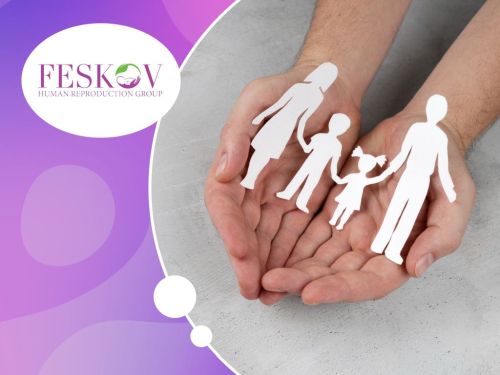
Surrogacy and adoption: understanding the legal differences

People facing infertility problems continue to struggle for parental happiness in different ways.
- Genetic aspect: surrogate mother or adoption?
- Financial aspect: compensation and costs
- Matching process: adoption and surrogacy (going adoption and surrogacy)
- Screening and prenatal care for surrogacy and adoption
- Medical aspect. Surrogate mother against adoption
- Legal aspect: adoption versus surrogacy
- Relationships: adoption or surrogacy?
When choosing between adoption and surrogacy, everyone carefully weighs the pros and cons of each decision. On our blog we regularly cover the financial, legal and emotional aspects of adoption and surrogacy.
This material is devoted to a comparative analysis, which we hope will help intended parents understand what is right for their family: surrogacy or adoption.
Genetic aspect: surrogate mother or adoption?
For he vast majority of people, having a genetic connection with a child is important. That is why, despite the high cost, complexity and duration of the process, intended parents, when choosing adoption versus surrogacy, are still inclined to think about the possibility of the second option.
A surrogate mother can enable people diagnosed with infertility to have a genetic connection with the child. Pregnancy for a surrogate mother occurs after the transfer of an embryo created using the genetic material of the intended parents (or at least one of them). In adoption, none of the intended parents are blood relatives of the child. This complicates legal procedures for legalizationand can cause emotional consequences. In the case of surrogacy, being related to the child simplifies these processes.
When assessing the prospects of adoption versus surrogacy, get advice from a psychologist, refer to the experience of people who have already gone through these processes.
Financial aspect: compensation and costs

From the point of view of the inevitability of financial costs, it does not matter whether you choose adoption or surrogacy - both paths involve many paid services. Service and agency fees, legal fees and medical expenses.
Even when it comes to altruistic surrogacy, surrogate mothers receive compensation from the intended parents for all expenses incurred during pregnancy. If we are talking about the commercial nature of the service, then the need to pay a fee in addition to compensation for expenses makes surrogacy much more expensive than adoption.
When it comes to government funding, the scales in the “surrogacy versus adoption” pairing tip toward the latter. There are no federal tax benefits provided by law to families who adopt children. Adoptive parents have the right to receive partial compensation for rent and basic necessities. It is in itself illegal to receive financial benefits from adoption to the detriment of the interests of the child. In the case of surrogacy, intended parents can receive a one-time tax deduction, as well as partial compensation through insurance plans. Substantial compensation is only possible if a grant is received.
Thus, from a financial point of view, surrogate mother versus adoption will cost significantly more.
Matching process: adoption and surrogacy (going adoption and surrogacy)
When selecting a child for adoption, adoptive parents are guided by individual criteria, including gender, race, medical history, and the likelihood of contact with the biological parents after adoption. The opinion of government officials about the family applying for adoption is also decisive. The parties make many strict demands on each other, so this process cannot be called controlled and completely understandable. In this regard, of the options “adoption versus surrogacy,” the second option looks much more predictable.
In the case of surrogacy, the selection process is more relaxed: intended parents have the opportunity to freely choose the surrogate mother they like. If the surrogate mother agrees to work with this family, the parties will be free to establish contact and get to know each other better before starting the program.
Screening and prenatal care for surrogacy and adoption
From the point of view of a complete picture of the child’s health in the process of surrogacy and adoption (going adoption and surrogacy) there is a significant advantage of the first point. During the reproductive program and the intended parents and surrogate mother undergo a full medical examination, which excludes drug addicts with alcohol problems from entering the program. In this way, intended parents can be sure that the child will not be exposed to harmful substances during intrauterine development. In addition, the contract guarantees the surrogate mother medical supervision and all necessary treatment during pregnancy.
In adoption, screening of the birth mother planning to place the child for adoption is often limited to asking about drug or alcohol use, social history, and medical history. Prenatal medical care is at the discretion of the pregnant woman.
From the point of view of transparency of medical history in a “surrogate mother or adoption” pair, the first option is safer.
Medical aspect. Surrogate mother against adoption
A reproductive program with the participation of a surrogate mother involves a planned pregnancy resulting from the transfer of an embryo that has been carefully examined for chromosomal and other pathologies. This approach allows you to have some guarantees that your child is healthy.
In the case of adoption, prospective parents can only hope that those in whose care the child was during pregnancy before first meeting with the potential adoptive parents took a thorough medical history.
From a medical point of view, of the pair “surrogacy versus adoption,” the first option obviously wins.
Legal aspect: adoption versus surrogacy

In the case of surrogacy and adoption, the legalization process differs significantly. In the first case, a gestation agreement is signed before the embryo transfer process to ensure that the intended parents are the legal representatives of the child. Since the surrogate mother has no genetic connection to the child, she cannot choose to become the child's parent.
When adopting, you must obtain the written consent of the biological parents or the child's authorized representative to transfer parental rights to you, and then initiate the process of terminating these rights from the signatories. And if the birth mother or authorized representative decides not to transfer parental rights to you, the adoption may not go through.
In light of this aspect, surrogacy brings some certainty to the life of the intended parents.
Relationships: adoption or surrogacy?
In some cases, birth mothers wish to maintain contact with the family who adopted their child. In surrogate mothers, this desire is often less expressed (except for cases when a relative or friend became a surrogate mother for you).This point is subjective for each individual intended parent: some willingly maintain contact with people involved in the birth of their child, others prefer to keep the birth a secret. Therefore, on this point it is difficult to say which is preferable: surrogacy or adoption.
Again, we hope that this material will help you organize your thoughts and make the best decision for your family.
- Surrogate motherhood - how not to be deceived
- Advantages of guaranteed surrogacy programs over programs with guaranteed compensation
- Surrogacy in Mexico: What You Need to Know
- Disadvantages of Egg Donation - Only Truth about the Procedure
- Unique Cases of Giving Birth to Children
- How the History of Surrogacy Changed Over the Years
- Why I Chose Surrogate Motherhood with Feskov
- The First Meeting: 5 Helpful Tips for Surrogates & Intended Parents
- Pregnancy After Miscarriage: Getting Pregnant
- Surrogacy in Ukraine: Legal Aspects
- Women's Age And Fertility
- Alcohol And Fertility: Drinking While Trying To Conceive
- Historical Changes to Surrogate Laws in Israel
- TOP 5 surrogate clinics in Ukraine
- International Surrogacy Program Ukraine-Canada
- Why is surrogacy so expensive — what do you pay for
- 15 facts about Surrogacy
- Egg donation in Canada
- Unique Cases of Giving Birth to Children
- Private surrogacy in the UK
Join my mailing list to receive the latest news and updates
What is the fundamental legal difference between surrogacy and adoption?
read moreIn the case of surrogacy, you go through the process of legalizing a child who is genetically your own, born with the participation of a gestational carrier. Your parental rights are protected by an agreement signed before the start of the reproductive program. Adoption involves accepting into your family a child who was given up for adoption by a genetic mother or a government official representing the interests of a minor.How does parental rights work in surrogacy compared to adoption?
read moreYou acquire parental rights to a child born by a surrogate mother even before his birth based on genetic relationship. In the future, lawyers will help you document them by receiving a birth certificate, where you will be indicated as the parents. In the case of adoption, you will have to go through a lengthy process to review your candidacy as a prospective adoptive parent/family.Can intended parents choose the child's genetic material in both surrogacy and adoption?
read moreWhen participating in a reproductive program with a surrogate mother at the embryo creation stage, the intended parents can influence the selection of the best embryo for transfer. This may be the choice of sex (for medical reasons or at the request of the intended parents), as well as the selection of the most promising embryo in terms of the ability to implant (according to the recommendation of an embryologist). During adoption, the intended parents do not have the opportunity to influence the child's genetic material, since it is inherited randomly from the genetic parents.What role do birth parents play in surrogacy and adoption, and how do their rights differ?
read moreIn the surrogacy process, intended parents have greater freedom of action and greater control: from choosing a surrogate mother and creating an embryo to confirming parental rights in court. When adopting, intended parents are in a more dependent position on third parties: the genetic mother may change her mind about giving the child up for adoption, you may be denied adoption if you do not meet the criteria defined by law.
